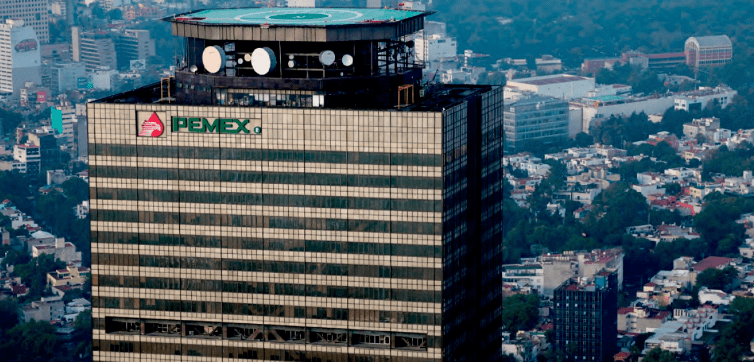Petróleos Mexicanos (Pemex) and the Federal Electricity Commission (CFE) will increase their profits from 2020 to 2024, the Ministry of Energy (Sener) set in its Energy Sector Program 2020-2024 as one of its objectives.
The Program was published this Wednesday in the Official Gazette of the Federation (DOF).
Specifically, Sener seeks to strengthen the productive companies of the Mexican State as «guarantors of energy security and sovereignty, and a lever for national development to detonate a multiplier effect in the private sector.»
The indicator to be increased measures the gross operating profit calculated before the deductibility of financial and tax expenses (interest, taxes, depreciation and amortization).
Pemex and CFE
According to Sener, in recent years efforts have been made to incorporate the private sector in promoting renewable energy. However, an important participation of the State Productive Companies (EPE -Pemex and CFE-) is needed in the energy transition, to guarantee universal access to energy.
Likewise, it is required to promote science, technology and engineering for the reindustrialization of the country, through the development of production chains of inputs for the manufacture of critical equipment for energy generation by taking advantage of available renewable resources.
«This will contribute to the creation of new national jobs and technologies, in addition to promoting the training of specialists, technicians and researchers in the area of renewable energy,» Sener said in the document.
In order to meet the energy transition goals, this administration establishes as a priority objective «Raise the level of efficiency and sustainability in the use of energy», with an approach that contributes to mitigating the effects of climate change and guarantee the rights of indigenous peoples and other social groups settled in the areas where energy projects are carried out, creating spaces for consultation and participation in energy generation projects under the Guiding Principle of the PND «Leave no one behind, don’t leave anyone out. »
Ensure universal access to energy, so that all Mexican society has them for their development.
Business and government
Sener’s relationship with the private sector was characterized, in past administrations, by a market approach, with which government entities limited themselves to taking into account its recommendations and requests to include them in public policies and respective national regulatory frameworks. .
Likewise, he argued, in relation to the social sector, the projects undertaken presented generic operating rules that prevented their correct implementation in time and with adequate budget management.
During the current administration, infrastructure projects are included that allow increasing the supply of natural gas to the south of the country, such as the reconfiguration of the Cempoala compression station that began operations in November 2018 and will be completed in the first quarter of 2020, thus such as the Mayakán Interconnection (Cuxtal I Project), infrastructure that will supply the Yucatan Peninsula with natural gas, scheduled to conclude during the third quarter of 2020.
Pemex and recent changes
On December 16, 2019, through agreement number A / 043/2019, the Energy Regulatory Commission (CRE) left without effect the A / 057/2018 agreement that establishes Pemex Transformación Industrial the Methodology to determine first-hand sale prices and in the storage terminals.
In this sense, the asymmetric regulation for Petri in gasoline and diesel is eliminated, in two main areas: methodology to set first-hand sales prices, and the obligation that Petri has to publish its prices in advance.
That is, Pemex is no longer a dominant agent in the market, in terms of the Thirteenth Transitory article of the Hydrocarbons Law.
The elimination of asymmetric regulation will positively impact Pemex by allowing it to continue to lose revenue, since its prices were unjustifiably bumped, and that its competitors took advantage in the market by unduly knowing their sales prices well in advance.
Foreign trade regulations
On February 22, 2019, a modification to the Agreement establishing the classification and coding of Hydrocarbons and Petroleum Products whose import and export is subject to prior permission by the Ministry of Energy, was published in the DOF, in which requires applicants for import permits with a validity of one year to demonstrate documentary that they have access to the supplier, logistics and, where appropriate, clients to carry out the authorized activity.
This will verify that applicants have the necessary elements to exercise the rights derived from import or export permits for hydrocarbons and petroleum products.

The neglect of Pemex’s onerous tax regime, by previous governments, resulted in the company’s debt increasing steadily and for the 2013-2018 period, it presented an average growth rate of 21% per year; With this, the EPE doubled its debt, going from 1.06 trillion pesos in 2013 to 2.12 trillion pesos in 2018.
This administration has managed to stabilize the historical decline in the production of crude oil and natural gas, which started from 2004 for crude oil and 2009 for natural gas, since for the period January – December 2019, this variable already showed a point of inflection, presenting a positive trend of 5.7 and 9.0%, respectively.
The physical budgetary investment of Pemex Exploración y Producción was 210,746 million pesos in 2019, higher by 31% compared to 2018.

